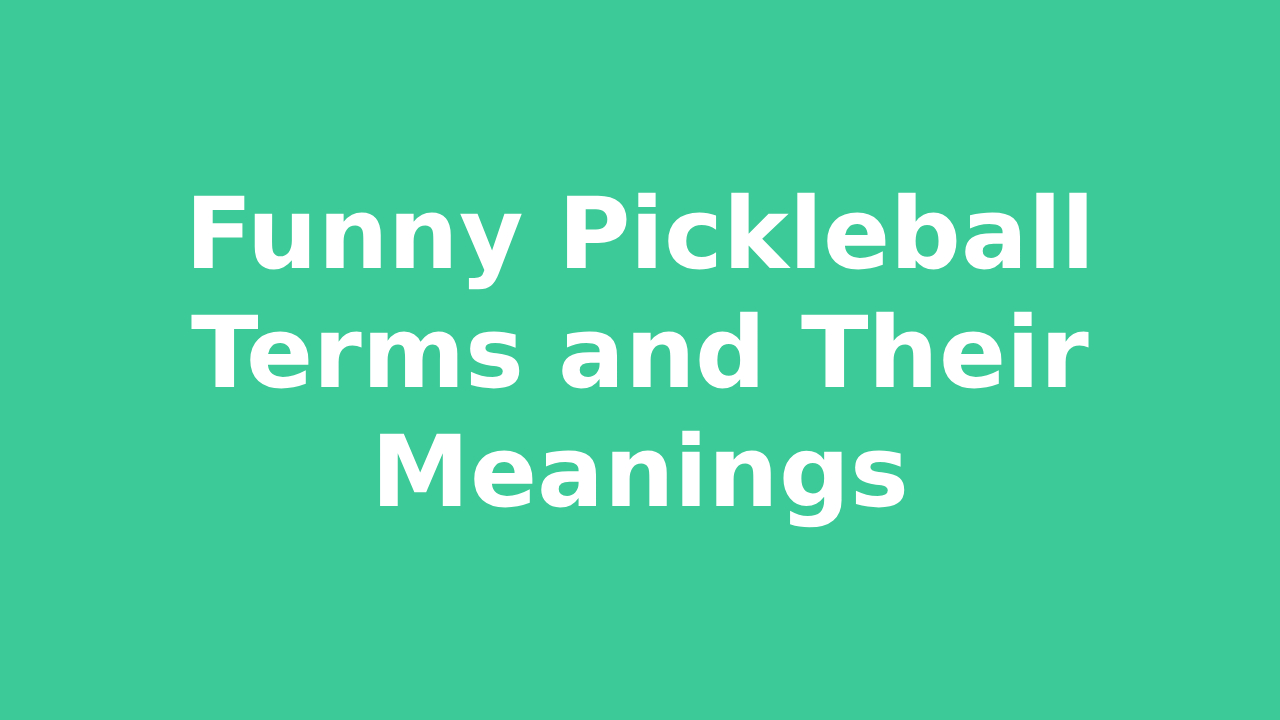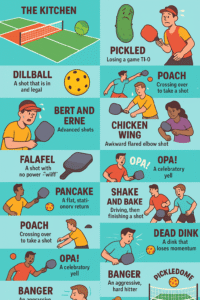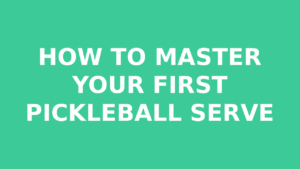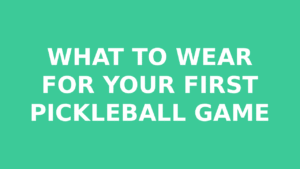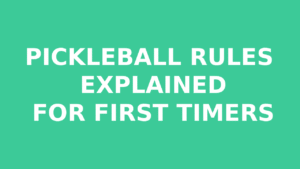Pickleball may be America’s fastest-growing sport, but it’s also one of the quirkiest. Players don’t just hit balls across the net—they lob “dinks,” aim for the “kitchen,” and sometimes suffer from something called the “yips.” If you’re new to the game, you might feel like you stumbled into a comedy routine instead of a sporting match.
But that’s part of the charm. Pickleball has always had a playful spirit, and its language reflects that. In this article, we’ll break down the funniest pickleball terms, explain what they mean, and share the backstory behind why they’ve become part of the sport’s culture.
Grab your paddle, hold onto your sense of humor, and let’s explore the wacky world of pickleball lingo.
1. The Kitchen
What it means: The “kitchen” is the non-volley zone—the 7-foot section on either side of the net where players are not allowed to hit the ball out of the air.
Why it’s funny: In most sports, kitchens are where snacks are made, not where games are won. But in pickleball, “stay out of the kitchen” is serious advice. Step in at the wrong time and you lose the point.
Fun tip: A lot of players joke that they already spend enough time in their home kitchen, so they’re not about to camp out in this one too.
2. Dink
What it means: A dink is a soft, controlled shot that just clears the net and lands in the opponent’s kitchen.
Why it’s funny: The word sounds silly—like something out of a children’s cartoon—but it’s actually one of the most strategic shots in pickleball. Mastering the dink is like mastering sarcasm: it looks simple, but done well, it can dismantle your opponent.
Fun tip: A “dinking battle” can sometimes go on for 20+ soft shots in a row, making players look like they’re having a slow-motion pillow fight.
3. Pickled
What it means: When a team scores zero points in a game, they’ve been “pickled.”
Why it’s funny: Getting completely shut out already stings—but calling it being “pickled” makes it sound like you were dunked in brine and put on a shelf.
Fun tip: Some groups of players make it tradition that if you get pickled, you owe everyone else a jar of actual pickles.
4. Dillball
What it means: A shot that’s in and legal.
Why it’s funny: The word “dill” sneaks in as a nod to pickles, and saying “that’s a dillball” just sounds like you’re inventing new slang on the playground.
Fun tip: Use this term loudly and often to confuse newbies—it’ll make you sound like a seasoned veteran.
5. Bert and Erne
What it means: These are advanced shots where players poach a ball by running across the court. An “Erne” is when a player leaps outside the sideline near the kitchen and smashes the ball; a “Bert” is when a doubles partner crosses over and poaches the ball in front of their teammate.
Why it’s funny: They’re named after Sesame Street characters, making it sound like kids’ TV meets extreme sports. You half-expect someone to yell “Rubber duckie!” when they pull one off.
Fun tip: Try yelling “Bert!” or “Erne!” dramatically during play—it makes even failed attempts entertaining.
6. The Yips
What it means: When nerves or hesitation cause a player to suddenly struggle with an easy shot.
Why it’s funny: Everyone eventually gets the yips, and when you do, it feels like your paddle has turned into a wet noodle.
Fun tip: Laugh it off. The yips love pressure—ignore them, and they usually go away.
7. Falafel
What it means: A shot that doesn’t travel far because it hit off the paddle with no power—basically, a pickleball “whiff.”
Why it’s funny: It shares its name with a tasty Middle Eastern dish, so it’s hard to take the mistake too seriously.
Fun tip: Some players jokingly call it “hummus” if the ball is extra mushy.
8. Pancake
What it means: A way of returning a hard-hit ball by holding your paddle out flat, like a frying pan.
Why it’s funny: It looks lazy but can be surprisingly effective—like breakfast food saving your dignity.
Fun tip: Bonus points if you actually yell “PANCAKE!” while doing it.
9. Poach
What it means: When a doubles player crosses over into their partner’s side to take a shot.
Why it’s funny: The word sounds sneaky—like you’re stealing eggs or illegally hunting. It can also cause heated debates if your partner thinks you’re “poaching” too often.
Fun tip: Successful poaching makes you look like a hero. Failed poaching makes you look like a ball hog.
10. Pickleball Widow (or Widower)
What it means: A spouse who feels neglected because their partner is always playing pickleball.
Why it’s funny: The sport is so addictive that it really does cause relationship drama sometimes. At least the term makes light of it.
Fun tip: Bring your partner to the court—many “widows” eventually become players themselves.
11. Chicken Wing
What it means: When a ball comes at your body and you awkwardly bend your elbow out like a chicken wing to block it.
Why it’s funny: It looks ridiculous, but it’s a real survival move.
Fun tip: If you hit a winner with a chicken wing shot, flap your arm like a chicken for celebration.
12. Lobster Trap
What it means: When you get stuck at the back of the court while your opponent keeps you pinned with high, deep shots.
Why it’s funny: The name makes it sound like you’re caught in a fisherman’s net instead of a strategic rally.
Fun tip: The best way out of a lobster trap is patience—wait for your chance to move forward.
13. Opa!
What it means: A celebratory yell often used after the serve, borrowed from Greek culture.
Why it’s funny: It’s random, it’s loud, and it makes every rally feel like a party.
Fun tip: Try yelling “Opa!” after a point—you’ll either get laughs or new friends.
14. Shake and Bake
What it means: A doubles strategy where one player drives the ball hard (the “shake”), and the partner rushes in for a finishing shot (the “bake”).
Why it’s funny: Sounds less like strategy and more like a 1980s dance move—or a chicken coating mix.
Fun tip: When you pull this off, yell “Shake and bake, baby!” for maximum effect.
15. Dead Dink
What it means: A dink shot that loses momentum and just dies in the kitchen.
Why it’s funny: The phrase sounds like a crime novel title, but it’s just describing a perfectly placed soft shot.
Fun tip: Dead dinks are brutal—they force your opponent to sprint forward and usually result in errors.
16. Banger
What it means: A player who always smashes the ball hard, rather than using finesse.
Why it’s funny: The word “banger” sounds like either a rock concert or a sausage breakfast, but on the court it’s both loved and hated.
Fun tip: Bangers can be predictable—slow the game down with dinks and they’ll often self-destruct.
17. Skinny Singles
What it means: A version of singles pickleball where players only use half the court.
Why it’s funny: It makes you imagine a group of very thin players running around, but really it’s just a way to practice strategy.
Fun tip: Great for when courts are crowded—two games can fit on one court.
18. Nasty Nelson
What it means: When the server deliberately aims the ball to hit the opponent at the net.
Why it’s funny: It’s named after pro player Tim Nelson, and while it sounds mean, it’s totally legal.
Fun tip: If you land one, try to look apologetic. If you get hit, try to laugh it off—it happens.
19. Pickledome
What it means: The championship court at a pickleball tournament.
Why it’s funny: It sounds like a professional wrestling arena where players fight for glory.
Fun tip: Even if you never make it to a real Pickledome, you can always call your local court by the same name.
20. Slammers vs. Dinkers
What it means: A playful way to describe different player styles—hard hitters (slammers) versus soft-touch players (dinkers).
Why it’s funny: It makes every local game sound like an old-school gang rivalry.
Fun tip: Most players start as slammers and evolve into dinkers over time.
Why Pickleball Lingo Matters
At first glance, pickleball terms might seem silly, but they’re part of what makes the game approachable and fun. Sports like tennis and golf sometimes feel intimidating with their traditions and seriousness. Pickleball flips the script—its goofy vocabulary helps new players feel welcome and keeps everyone smiling even during tough matches.
Final Thoughts
Whether you’re dodging the kitchen, surviving a chicken wing shot, or laughing at a falafel mishit, pickleball lingo is half the fun of playing. The sport doesn’t just give people exercise—it gives them stories to tell, jokes to share, and a culture that’s as quirky as its name.
So next time you step onto the court, don’t just play the game—embrace the language. Yell “Opa!” after a serve, celebrate your dead dink, and if you ever get “pickled,” just remember: you’re officially part of the club.

